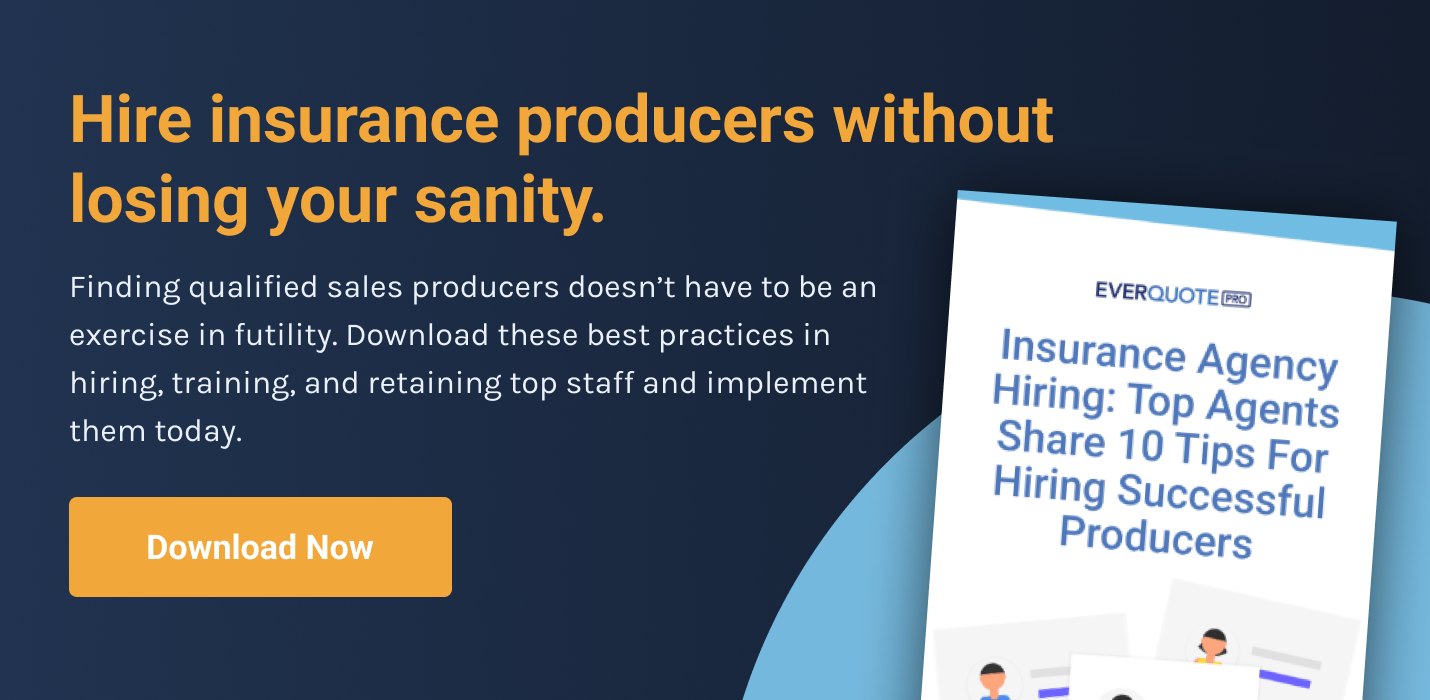- Home»
- EverQuote Pro Blog»
- Insurance Agency Hiring: Tips For Getting Started
Insurance Agency Hiring: Tips For Getting Started

When it comes to hiring and staffing, how can agents find qualified candidates?
Should you hire someone with insurance experience for a producer role?
How do you ensure a candidate is a good long-term fit?
Can you find and hire people who can be “molded” into your agency’s systems and sales process, or is insurance experience a “must”?
And how can you help ensure that a new hire sticks with your agency long term?
We’ve asked successful agents across the country to share their experiences and advice for hiring, training, and retaining top producers and staff, and boiled their answers down into best practices you can implement in your agency. They are presented according to the three stages of the hiring and retention lifecycle:
- The Search: Finding & identifying the best candidates
- Interview Process: Assessing individual candidates
- On-Boarding: Training and retaining top producers
In this article, we’ll focus only on part one, the search to find the best producers for your agency. To read the entire guide and learn all 10 best practices, click here.
Part 1: The Search—Finding & Identifying The Best Candidates
The producer hiring process can feel fraught with risk. A producer may accept a position with your agency but then leave shortly after starting to work for another agent or carrier; or, you might spend a significant amount of time and money training a new producer only to have him or her complete the training, pass their licensing exam, and then take a job with a competitor.
The last thing an agent wants to do is spend time and resources on an employee who’s only leveraging the training to find a “better” job. This can be a particularly painful issue if your carrier is known for providing excellent training, but perhaps a less-than-desirable base salary.
When it comes to this first stage in the hiring process, you should do everything in your power to mitigate risk, ensuring you invest only in those candidates with the highest probability of becoming long-term employees who will have a positive impact on the business.
1. Identify candidates who have the qualifications and temperament for long-term success with your agency.
Determining if a candidate fits with your business is much easier said than done. The good news? There are things you can do to find and identify the right candidates.
Unfortunately, this stage is often overlooked. Many agents simply put up a job posting and then interview the candidates with the most insurance experience on paper (or, lacking that, those with sales experience). The problem is that the candidate with the best-looking resume may not be the best long-term fit for your business. (Tweet this!) That isn’t to say there won’t ever be people with great resumes who end up being amazing producers. But if you put too much stock into resumes, you risk passing up the candidate who might be the producer you’re looking for. Here are some things to keep in mind at the beginning stages of your search:
- Before you start the hiring process, make sure you have the bandwidth to focus on hiring. It may sound simplistic, but when you need to hire, your focus should be on searching for candidates, interviewing them, and onboarding them. We recommend you don’t take on other major projects at the same time as hiring. While there will always be things you’ll have to do every day (like calls, meetings, etc.), most of your time should be spent on hiring—not rolling out a new marketing initiative, planning a trip to a conference, revamping your website, etc.
- Have a general job description for all the positions you may need to hire for. Be prepared for the inevitable turnover by having job descriptions at the ready. (Some agents use a site like Indeed.com to post jobs when the time comes.) If you don’t have a template for an insurance job description, you can use the one included in this article for general hiring purposes.
- Don’t get overwhelmed by the hiring search. The search is where you are the least likely to identify exactly who will be a long-term fit as a new hire. The search is important, but don’t get caught up dissecting each and every detail of candidates’ resumes. That’s not to say you shouldn’t spend time reviewing candidates’ qualifications, but make sure you’re not dedicating hours upon hours trying to pinpoint the “perfect candidate” based on a resume. Once you get to the interview process stage (phone screens, face-to-face interviews, etc.) you’ll start to get a fuller picture of which candidates best align with your agency’s needs. Many of our most successful agents cast a fairly wide net when it comes to prospects they’ll initially consider for a phone screen or interview. And remember to be aware of any preconceived notions you might have about resume quality correlating to success in a sales producer role.
- Don’t get hung-up on resume formatting. Don’t immediately discount a candidate because their resume appears poorly formatted. When candidates apply via job sites like Indeed, these platforms sometimes reformat the uploaded resume, often making it much more difficult to read.
- A resume equals one data point. Think of a resume as one data point among many that you’ll be reviewing for your assessment. It’s true that the resume is important, but it’s not always the be-all-end-all. More often than you might think, agents tell us they hire candidates whose resumes weren’t stellar, but who surprise them in interviews and on the job. In addition to a resume, look at things like skill assessment tests, conversational skills, their ability to follow instructions, timeliness, etc. Understanding the resume is important, but it’s one part of the whole picture; looking at all the pieces together will help you better understand if a candidate is a good fit.
- Call a candidate you’re interested in the moment you receive their application. If you wait to contact an applicant, chances are they’ve already applied to a number of different roles and may not specifically recall your open position. By doing this, you can also quickly assess the candidate’s conversational phone skills.
Want to know what’s in parts two and three? Get the entire insurance agency hiring guide for free now. Just click below to keep reading!
Unlock predictable growth with EverQuote.
Our representatives are standing by to help you succeed.
Call 844-707-8800
Weekdays, 9AM-5PM (ET)
Call 844-707-8800
Weekdays, 9AM-5PM (ET)
Accelerate your growth.
Complete the form below or just call 844-707-8800 to learn how we can help you achieve your goals.
By clicking "Get Started", I consent by electronic signature to being contacted by EverQuote, including by automatic telephone dialing and/or an artificial or prerecorded voice (including SMS and MMS - charges may apply), regarding EverQuote for Agents, even if my phone number is listed on a Do Not Call Registry. I also understand that my agreement to be contacted is not a condition of purchasing any goods or services, and that I may call (844) 707-8800 to speak with someone about EverQuote for Agents.
By clicking "Get Started", I affirm that I have read and agree to this website’s Privacy Policy and Terms of Use, including the arbitration provision and the E-SIGN Consent.
* Mandatory fields
 Product Overview
Product Overview Blog
Blog FAQs
FAQs Webinars
Webinars eBooks & Resources
eBooks & Resources